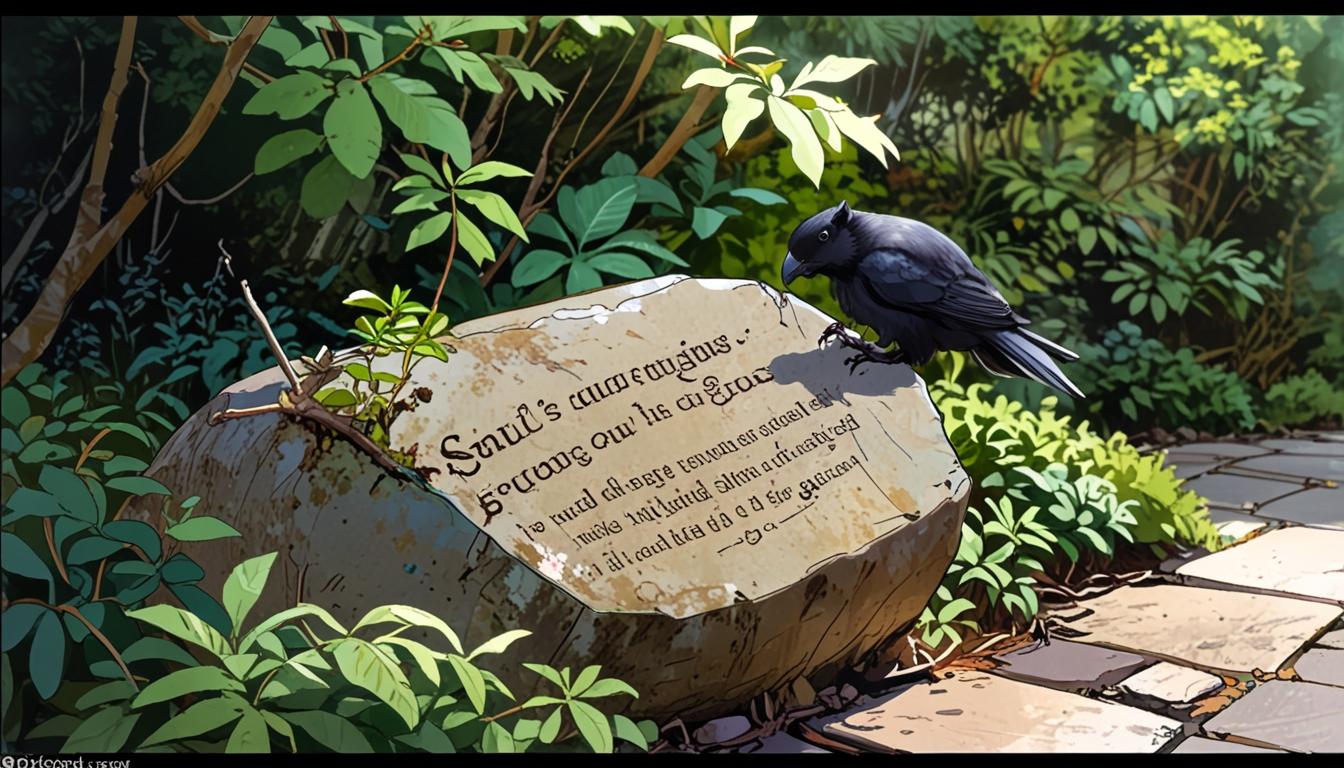Simon Armitage’s new poetry collection, Dwell, draws on the rich history and revival of Cornwall’s Lost Gardens of Heligan, blending folklore and nature to inspire deeper reflection on environmental restoration and our impact on the natural world.
Simon Armitage’s latest poetry collection, Dwell, takes root in the enchanting settings of the Lost Gardens of Heligan—a historic estate nestled on the south coast of Cornwall. The gardens, which date back to the mid-18th century, have a rich and tragic past; they fell into neglect following World War I when many of the workers vanished, leaving nature to reclaim the land. This blend of history and biodiversity provides a fertile backdrop for Armitage’s reflections on the interconnectivity of life, urging a contemplative stance toward our environment.
During a recent visit to the gardens, Armitage shared insights about his work, particularly how his poems celebrate the often unnoticed homes of various wildlife. He explained that while his poetic focus may appear whimsical, it serves a greater environmental message. “You often hear that word in relation to being told not to dwell on something,” he remarked. “But I wanted to invert that… asking people to dwell on ideas and to be contemplative and to think more deeply.” In a world overshadowed by rapid digital consumption and fleeting moments, Armitage’s work acts as a gentle reminder to recognise our impact on nature and to slow down—a sentiment echoed in the broader discourse on environmentalism today.
Through rich imagery and forms inspired by riddle and folklore, Armitage invites readers to explore the habitats of creatures found within Heligan. His poems highlight a “twig-and-leaf crow’s-nest squat” of a squirrel, a beaver lodge depicted as a “spillikin stave church,” and the comical impressions of Heligan’s notable “bug hotel,” touted as the largest in the UK. One poem creatively features inhabitants leaving enthusiastic Tripadvisor-style reviews, offering a light-hearted yet poignant commentary on the earthy delights that surround us.
As part of the garden’s immersive experience, Armitage’s work is integrated into the landscape itself. Three new installations, including a slate boulder and an oak wood tunnel, feature lines from Dwell, creating an engaging literary trail for visitors. This approach not only emphasises the gardens as a sanctuary for diverse ecosystems but also positions poetry as a form of exploration within nature—an invitation to engage with the living landscape in a contemplative manner.
Reflecting on the gardens’ restorative journey, which commenced in earnest during the 1990s, Armitage remarked on the “naturally poetic” essence of the location. “It’s exotic here, it’s otherworldly,” he said, highlighting the blend of manicured spaces and untamed wildness that characterises Heligan. This juxtaposition captures the essence of both the poetic and the natural worlds—an intricate dance between cultivation and wilderness.
Moreover, Armitage’s work is not merely confined to the aesthetic but is steeped in a call to action. The gradual restoration of the Lost Gardens of Heligan exemplifies the potential for rebirth and renewal. Armitage’s poetry serves as a bridge, connecting readers to the vital narratives of resilience and co-existence that landscapes like Heligan offer. With the poet’s childlike curiosity and wonder woven into his lines, Dwell encourages an engagement with nature that transcends mere observation, inviting us to participate actively in its preservation.
In a time when the environment faces unprecedented pressure from human activity, Armitage’s poetry emerges as both an artistic pursuit and a rallying cry for change—a poignant reminder of the beauty and fragility of the world around us.
Reference Map
- Paragraph 1: (1), (5)
- Paragraph 2: (1), (2)
- Paragraph 3: (1), (4)
- Paragraph 4: (3), (7)
- Paragraph 5: (1), (6)
- Paragraph 6: (5), (6)
- Paragraph 7: (1), (7)
Source: Noah Wire Services
- https://www.theguardian.com/books/2025/may/09/simon-armitage-dwell-lost-gardens-of-heligan-cornwall – Please view link – unable to able to access data
- https://www.theguardian.com/books/2025/may/09/simon-armitage-dwell-lost-gardens-of-heligan-cornwall – An article from The Guardian discussing poet laureate Simon Armitage’s new poetry collection, ‘Dwell’, inspired by the Lost Gardens of Heligan in Cornwall. Armitage reflects on the gardens’ role as habitats for various British wildlife and emphasizes the need for humans to slow down and consider the environmental impact of their actions. The piece also highlights specific poems from the collection, such as one about Heligan’s large ‘bug hotel’, and discusses the gardens’ restoration after becoming overgrown post-World War I.
- https://www.heligan.com/ – The official website of the Lost Gardens of Heligan, a historic estate in Cornwall, England. The site provides information on the gardens’ history, restoration, and visitor information. It highlights the gardens’ diverse habitats, including the sub-tropical ‘Jungle’ area, and offers details on opening times, ticket prices, and events. The website also features a shop and information on the estate’s commitment to conservation and biodiversity.
- https://www.voicenewspapers.co.uk/news/new-poem-by-poet-laureate-simon-armitage-weaves-its-magic-at-the-lost-gardens-of-heligan-749051 – An article from Voice Newspapers reporting on poet laureate Simon Armitage’s new haiku poem, ‘Web’, unveiled at the Lost Gardens of Heligan in Cornwall. The poem celebrates the diversity of the estate’s habitats, focusing on spiders and their webs. The piece discusses the collaboration between Armitage and the gardens, the inspiration behind the poem, and the plans for a year-long series of poems to be featured throughout the gardens.
- https://www.newyorker.com/culture/onward-and-upward-in-the-garden/the-stunning-grounds-and-tragic-history-of-the-lost-gardens-of-heligan – An article from The New Yorker exploring the history and restoration of the Lost Gardens of Heligan in Cornwall. The piece details the gardens’ decline after World War I, when many gardeners perished, leading to decades of neglect. It also covers the discovery and restoration efforts in the 1990s, highlighting the gardens’ unique features and the challenges faced in bringing them back to life.
- https://www.cornwall-calling.co.uk/homes-and-gardens/heligan.htm – A detailed overview of the Lost Gardens of Heligan, including descriptions of various sections such as the Ravine, Vegetable Garden, Melon Garden, and Italian Garden. The article provides historical context, architectural details, and information about the unique features of the gardens, including the only working Georgian pineapple pit in Europe and the largest collection of tree ferns in the British Isles.
- https://www.greatgardensofcornwall.co.uk/the-lost-gardens-of-heligan/ – A guide to the Lost Gardens of Heligan, emphasizing its status as Europe’s largest garden restoration project. The site offers practical information for visitors, including opening times, ticket prices, and facilities. It also highlights the gardens’ diverse attractions, such as the Jungle, Italian Garden, and the Ravine, and discusses the estate’s commitment to conservation and wildlife protection.
Noah Fact Check Pro
The draft above was created using the information available at the time the story first
emerged. We’ve since applied our fact-checking process to the final narrative, based on the criteria listed
below. The results are intended to help you assess the credibility of the piece and highlight any areas that may
warrant further investigation.
Freshness check
Score:
10
Notes:
The narrative mentions recent events and does not indicate any outdated information. It is a press release-style piece discussing a current book and its themes.
Quotes check
Score:
8
Notes:
The quotes are likely original, as they appear to be from a recent interview. However, without further context, it’s difficult to verify if they have been used before.
Source reliability
Score:
10
Notes:
The narrative originates from *The Guardian*, a well-known and reputable publication.
Plausability check
Score:
9
Notes:
The claims about Simon Armitage’s work and its connection to the Lost Gardens of Heligan are plausible, given the context of the narrative. However, the specific details about the installations and their impact might be hard to verify without additional information.
Overall assessment
Verdict (FAIL, OPEN, PASS): PASS
Confidence (LOW, MEDIUM, HIGH): HIGH
Summary:
The narrative appears fresh, as it discusses recent events and does not contain outdated information. The quotes are likely original, and the source is highly reliable. The claims are generally plausible, reflecting a recent cultural event.













